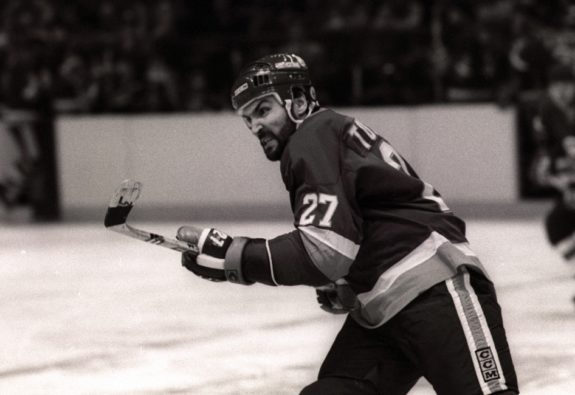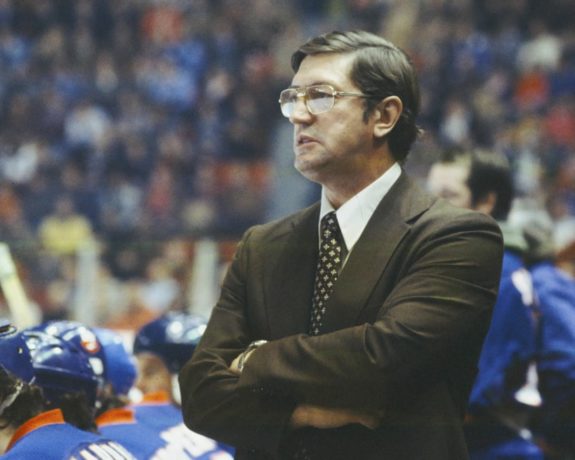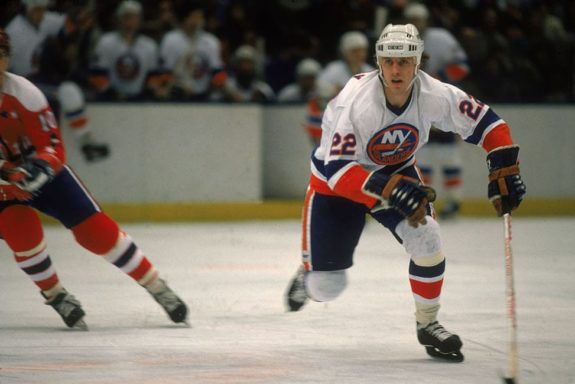It’s hard to imagine a team better than the 1981-82 New York Islanders.
The two-time defending NHL champs finished first in the regular-season standings (by seven points), set a league record for consecutive victories (15) and became the first (and still only) team based in the United States to win the Stanley Cup in three consecutive years. They led the NHL with 33 home wins, tied the Montreal Canadiens for the most road victories (21) and swept their conference final series and the Stanley Cup Final, something that hadn’t been done since 1970 and has been done just once since.
This was the best of New York’s four consecutive Stanley Cup champions from 1980-83 and arguably the best team to take the ice since the NHL came into being in 1917. These Islanders had the talent and coaching to play any style an opponent wanted to play and still win: They could skate with opponents who wanted to outscore them or grind with rivals who wanted to play a physical game. Mix that with a solid group of defensemen and the NHL’s best goaltender and you get a team for the ages.
“Core Four” Led the Way
The 1981-82 Islanders returned most of the team that had won the Cup in 1980 and 1981, including the “Core Four” of goalie Billy Smith, defenseman Denis Potvin, center Bryan Trottier, and right wing Mike Bossy. Those four future Hockey Hall of Famers were at the peak of their game in 1981-82: Smith led the NHL with 32 wins and won the Vezina Trophy as the league’s top goalie, Potvin, New York’s captain, scored 24 goals and finished with 61 points in 60 games.
The combination of Trottier and Bossy continued to make life miserable for goalies. Bossy scored 64 goals, finished with an NHL career-high 147 points (second in the NHL behind Wayne Gretzky) and had a plus-69 rating, earning First-Team All-Star honors. Bossy topped off his season by taking home the Conn Smythe Trophy as MVP of the Stanley Cup Playoffs. Trottier, whose passing helped make Bossy one of the great snipers in NHL history, scored 50 goals for the only time in his NHL career and finished with 129 points and a plus-70 rating — although he had to settle for being named a Second-Team All-Star behind Gretzky, whose 92 goals set an NHL record that may never be broken.
The support troops were a pretty formidable group as well. Clark Gillies, another future Hall of Famer, scored 38 goals and finished with 77 points. John Tonelli scored 35 goals and 93 points. Bob Bourne (24) and Bob Nystrom (22) also exceeded 20 goals, and the Islanders got a boost from the midseason call-up of 19-year-old center Brent Sutter. The younger brother of forward Duane Sutter was New York’s No. 1 pick in the 1980 NHL Draft; he stepped into the lineup and was a point-a-game player (43 points; 21 goals, 22 assists) in 42 games. Brent also demonstrated the grittiness that went along with being a Sutter, finishing with 114 penalty minutes.
Smith and 21-year-old Roland Melanson were a formidable duo in goal. Melanson, playing his first full NHL season after joining the Islanders to stay when Glenn Resch was dealt to the Colorado Rockies prior to the 1981 NHL Trade Deadline, was an excellent complement to Smith, allowing coach Al Arbour to avoid burning out his starter before the Stanley Cup Playoffs. Melanson went 22-7 with six ties; Smith, who was 10 years older, went 32-9 with four ties. Their goals-against averages (2.97 for Smith, 3.24 for Melanson) and save percentages (.898 for Smith, .896 for Melanson) don’t look good by today’s standards, but they were first-class performances in 1981-82 when the average NHL game featured 8.03 goals, the most of any season since World War II.
Arbour, a four-time Cup winner as a player, worked hand-in-hand with general manager Bill Torrey, the man who convinced him to come to Long Island in the summer of 1973. Few coach-GM combinations in NHL history have lasted longer or been more successful. Torrey got Arbour the talent, and the man known as “Radar” did the rest.
The Islanders wasted little time running away from the rest of the Patrick Division. They went 4-0 with one tie in their first five games before losing, then went 4-0-2 in their next six. After a midseason spurt that saw them go 10-2-0, the Islanders had left the rest of the division in the dust.
Streaking Into NHL History
But the best was yet to come.
One night after a 3-2 loss to the archrival New York Rangers at Madison Square Garden, the Islanders returned home on Jan. 21 and pummeled the Pittsburgh Penguins 6-1. Two nights later, they avenged the loss to the Rangers by winning 6-1 at Nassau Coliseum.
For the next four weeks, the Islanders were unstoppable. They had won 14 in a row, matching the longest winning streak in NHL history, when the lowly Rockies came to the Coliseum on Feb. 20, 1982. Resch, a fan favorite on Long Island before being traded to Colorado, nearly spoiled the party — he and the Rockies battled the Islanders to a 2-2 standoff with less than a minute remaining in the third period during an era before overtime or shootouts, meaning that the streak would have ended. But Tonelli’s slap shot beat Resch with 47 seconds remaining to give the Islanders a record-setting 3-2 victory.

The streak ended the next night in Pittsburgh, but the Islanders lost just once more all season. They ended with a 10-game unbeaten streak (seven wins, three ties) to finish 54-16-10.
The NHL changed playoff formats for 1982, with the first two rounds played within each of the four divisions before the survivors advanced to the conference finals. For the Islanders, that meant a series against the fourth-place Penguins, who had finished 43 points behind New York during the regular season.
Games 1 and 2 of the best-of-5 series were blowout wins by the Islanders at Nassau Coliseum. But to the surprise of everyone, including Pittsburgh owner Edward DeBartolo, the Penguins avoided elimination at home by winning Game 3 in overtime and then thumped the Islanders 5-2 in Game 4.
Pesky Penguins
“I think that was our best team — we had a good group of guys, and we were kind of cooking,” Nystrom said years later. “It’s a funny thing, though — we always had trouble with Pittsburgh.”
Nystrom, who had missed the first four games with a groin injury, scored the first goal in Game 5. But the Penguins scored the next three and still led 3-1 when defenseman Randy Carlyle was penalized with 7:04 remaining in regulation time.
This is when Arbour showed that he didn’t earn induction into the Hall of Fame by accident. When New York’s first unit hadn’t scored halfway through the power play, he took advantage of a rule on the books at that time to get his big guns a rest. Much to the consternation of everyone at the Coliseum, Melanson skated onto the ice to replace Smith. But Arbour knew that under the rules used then, a new goalie was allowed a two-minute warmup — enabling the Isles to get their top unit a breather.

The stratagem paid off when defenseman Mike McEwen, the key piece acquired from Colorado in the Resch trade, went to the net and banged in a loose puck to get the Islanders within 3-2. They tied the game with 2:31 remaining when a dump-in hopped over Carlyle’s stick and came right to Tonelli, who snapped it past Michel Dion.
Smith lived up to his burgeoning reputation as a money goalie by robbing Mike Bullard in OT before Tonelli jammed home the rebound of Nystrom’s shot 6:19 into overtime for the dynasty-saving 4-3 win.
“Johnny went into the corner and threw it out to me,” Nystrom said. “I deked and I was just about to put the puck into the net when (Penguins forward) Pat Boutette came and pulled me down. I was laying on my back and watched the puck go over me and into the net.”
Nystrom said Arbour’s overtime strategy was always simple.
“Al always stressed, ‘Let’s go at them — force, force, force. Attack them rather than fall back,'” he said. “He would say, ‘The worst thing that can happen is that we lose — let’s not lose sitting back on our heels.’
“We found a way to win, and we were able to go on and win four Cups.”
The Islanders went on to beat the Rangers in six games before sweeping the Quebec Nordiques in the conference final and the Vancouver Canucks in the Stanley Cup Final. The only one of the four wins against the Canucks that was close was the series opener when Bossy completed a hat trick by scoring with two seconds remaining in the first OT for a 6-5 win.

New York’s 3-1 victory in Game 4 at Vancouver completed the sweep and gave the Islanders their third consecutive championship, moving them into the ranks of NHL dynasties along with teams like the Toronto Maple Leafs of the late 1940s, the Canadiens of the late 1950s and the Canadiens of the late 1970s.
But none of those teams had to win four series to take home the Cup, and only the 1959-60 Canadiens swept the Semifinals/conference finals and the Stanley Cup Final (of course, there were only two rounds in the Original Six era). The Islanders are the NHL’s most underrated dynasty, having been sandwiched between the late 1970s Canadiens and the late 1980s Edmonton Oilers.
The 1981-82 Isles didn’t have the aura of the Canadiens’ dynasties or the brashness and firepower of the Oilers’ dynasty that followed them. What they did have was an almost-perfect team — a blend of scoring, grit, defense, coaching, and management, the likes of which rarely comes along in any sport. The ’81-82 Islanders could beat you any way you wanted to play … and they did, especially when the stakes were the highest.